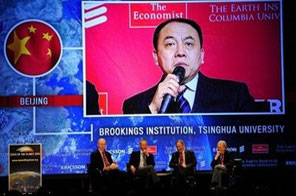Green economy could save planet: experts
NEW YORK: The planet is overheated, under-resourced, and almost out of time, but technical innovation and green economics could still save the day, experts and leaders told an international conference here.
Video-linked panels from Beijing, London, Mexico City, Monaco, Nairobi and New Delhi painted an alarming picture of environmental degradation and mass poverty at Thursday's conference in New York.
They called on the United States and other rich countries to show leadership, for example by investing in carbon capture technology and other long-term methods of reducing greenhouse gasses.
But developing countries, where pollution is growing rapidly, can also play a big role while also lifting their populations from poverty, they said.
"Green growth is the path to meeting the climate challenge. It can help us to lay the foundation for lasting and widespread economic recovery. It can help us reduce poverty," United Nations chief Ban Ki-moon told the conference at New York's Columbia University.
Mexican President Felipe Calderon, speaking by video link from the Mexican capital, said developing countries are hit hard by climate change, but can also gain much by encouraging environmentally friendly economies.
He said his country is cutting carbon emissions, replanting forests and aiming to generate a quarter of electricity needs from renewable resources by 2012.
"We can have prosperity this way, fighting climate change -- and a prosperity that will last a lot longer," Calderon said. "I am further convinced that the first countries to change will gain considerable competitive advantages."
Businesses around the world are rushing to catch that same green train.Related article:Britain plans 'green' investment bank
Nitin Desai at the Energy and Resources Institute said from New Delhi that India and China are "very proactive" in pursuing low-carbon technologies, including in the "huge, huge market" for renewable power.
Even simple innovations, such as animal-powered electricity generators in rural India and the spread of mobile phones in Africa, can transform isolated communities, while greening the economy, experts said.
At the other end of the scale, electricity giant Philips is eyeing a future where LED lights replace vastly less efficient old-fashioned bulbs, said Philips Research chief executive Peter Wierenga.
"Companies that will not (focus on) sustainable development are not going to be successful, because the public is changing," he said. "We take energy reduction seriously."
That change in attitude needs to operate on a huge scale to solve Africa's problems, said Achim Steiner, executive director for the UN Environment Program.
He urged the continent to stop being a "mine" for rich countries and turn over its natural resources instead to sustainable industry and a healthier environment.
"Agriculture, tourism, natural resources, forestry, these are the drivers of the economy today. So let's turn it around, instead of letting others take it out of here," he said from Nairobi.
Glenn Denning, who teaches professional practice at Columbia, pointed to agricultural renaissance in Malawi as a model of a green economy alleviating poverty and giving populations a stake in their country.
"What we've seen in Malawi is that when you stimulate agriculture and boost agricultural productivity, people do start to make savings," he said. "One of the first things they do is buy a mobile phone."
Experts warned that despite these trends, public trust in global warming scientists was shredded last year when an international climate summit in Copenhagen ended without agreement and the underlying scientific arguments came under fierce attack.
A follow up summit is planned in Cancun, Mexico, this November.
"What we have faced now is a crisis of trust, trust first in the science," Desai said.
Mark Cane, a climate sciences professor at Columbia, said governments and their public simply might not be ready to tackle what he said was impending disaster until "some kind of threat that they feel really viscerally."
"I really think it's not going to happen until nature performs and we start to see the effects and people get worried," agreed Wallace Broecker, an environment professor at the university.
"If the Arctic ice disappears in 20 years, that will send a very strong signal that things are happening."






